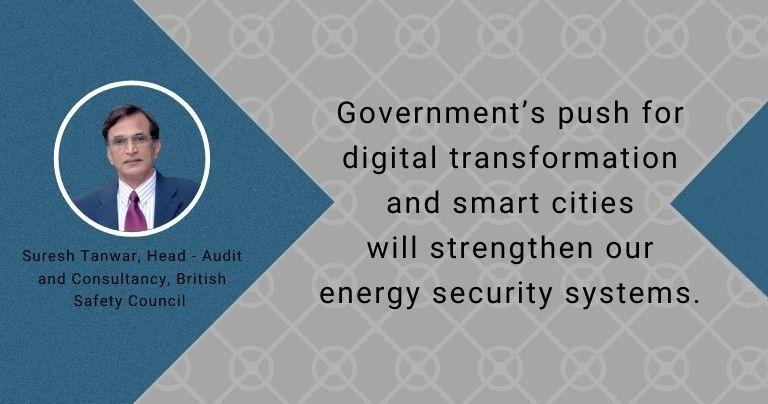Smart grids furnish integrated, efficient and reliable energy supply
By EPR Magazine Editorial December 23, 2021 12:36 pm IST
By EPR Magazine Editorial December 23, 2021 12:36 pm IST

Suresh Tanwar, Head – Audit and Consultancy, British Safety Council India in an interview with EPR Magazine.
How do you view the energy safety scenario in India?
The subject of energy safety as a whole is a very wide arena. There are a lot of factors that influence safety, depending on the type of energy source, and how it is produced, distributed, transmitted and consumed. These days, with better energy safety standards in the country, modern power plants are much safer than it was before.
That being said, people working in the power sector still encounter many hazards. Common hazards include electrical shocks and burns, boiler fires and explosions, and contact with hazardous chemicals apart from several other hazards. These hazards also depend on the type of power plant itself. In India, coal-fired power plants meet more than 50 percent of the energy demand, followed by hydroelectric and nuclear power plants. Such power plants are prone to hazards due to dust, heat, noise, vibration, radiation and disposal of hazardous waste. When it comes to power transmission and distribution, in India, high voltage transmission line projects are executed with the help of manual and semi-automated work. The hazards here include electrocution or fall from heights while performing stringing work.
What are the latest available security systems and safety solutions for clean energy in India?
As the sector transitions towards clean and green energy, increasing integration of power from renewable sources can pose a challenge to the power grids due to decentralisation and multidirectional power flows. The energy system will still need to maintain grid stability, ensure power quality, enable sector coupling, replace outdated assets and reduce costs. To counter these challenges, emerging smart grid technologies may prove to be useful.
Smart grids can provide efficient and reliable end to-end integration of renewable energy sources, smart transmission and distribution. These systems enable real-time monitoring and control of the power system with better safety standards and enhanced cyber-security; as well as help in the reduction of AT&C losses, demand response, and demand-side management, power quality management and outage management, among other benefits.
How do you evaluate the challenges and opportunities in securing the systems and energy platforms?
The key challenge is to integrate energy intelligence across the entire energy supply chain and make them cost-efficient, safe, reliable and flexible. As global energy systems become more interconnected, cyber security for critical infrastructure projects are becoming a growing concern for various countries. To address them, energy companies, government agencies and industry experts should jointly develop new models and frameworks to combat this threat. As technology evolves, new tools are being developed and the capability to unmask threats and counter them is also advancing rapidly.What kind of technologies and systems are in place to identify existing and expected risks? How are government policies helping you in the same?
As a critical infrastructure, the energy system needs to be protected from physical as well as cyber-attacks. To begin with, an industrial energy audit is an effective tool in defining and pursuing a comprehensive energy management program. A welldone energy audit will always help us understand more about the ways energy and fuel are used, and to identify areas where potential waste and areas for improvement. The energy audit would give a affirmative orientation to the energy cost reduction, preventive maintenance, and quality control programs that are vital for production and utility activities. Such audit programs will help us focus on possible variations occurring in the energy costs, availability and reliability of supply of energy. It further helps us decide on the appropriate energy mix, identify energy conservation technologies, and retrofit energy conservation equipment, among other things.
As per studies, modern technologies such as IoT can help the energy sector transform from a central, hierarchical supply chain to a decentralised, smart, and optimised system. IoT-based technology can be employed for improving energy efficiency, increasing the share of renewable energy, and reducing environmental impacts of energy use. IoT employs sensors and communication technologies for sensing and transmitting real-time data for fast computations and optimal decision-making.
Cloud computing is a data processing approach that offers services, applications, storage, and computing through the internet and allows the computation of data streamed from IoT devices. It is a secured system that enables the processing of big data and provides complex computation capabilities. In addition to this, Blockchain technology and Green-IoT as two future approaches that can help to tackle some of the challenges.
The government of India’s push towards digital transformation and smart cities will see our energy systems getting more secure in the future. Also, the long-awaited draft National Electricity Policy 2021 may just be a step in the right direction.
What are your latest offerings in terms of products/technologies for energy security/safety solutions for this sector?
The British Safety Council offers energy audit services that help in decision-making in the area of energy management. The audit also helps to balance the total energy inputs with their use and serves to identify all the energy streams in a facility. It quantifies energy usage according to its discrete functions.
The British Safety Council also offers environmental sustainability audits, process safety audits, occupational health and safety audits, fire safety audits and high-risk operations safety audits. In addition to audit services, the British Safety Council also offers a comprehensive suite of training and qualifications in health, safety, and environmental management.
We use cookies to personalize your experience. By continuing to visit this website you agree to our Terms & Conditions, Privacy Policy and Cookie Policy.